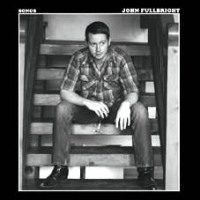John Fullbright – Songs

It’s enigmatic. Songs, simply for the sake of the words and melody…
As with Fullbright’s studio debut From the Ground Up (2012), Songs was co-produced with Wes Sharon and recorded at the latter’s studio 115 Recording in Norman, Okla. Songs delivers, in the main, stripped down renditions of one dozen originals by this son of Okemah. Four songs solely feature John on permutations of acoustic or electric guitar, piano or organ; on “Another Quartet,” he’s joined by David Leach (bass) and on “Until You Were Gone” by Ryan Engleman (steel guitar). While there’s nothing to indicate that a band album was intended, the remaining trio of songs feature additional players. (More about them later.)

John’s piano and acoustic guitar are supported on “When You’re Here” by Sharon (bass), Daniel Walker (C3 organ), Tony “Buffalo” Ware (electric guitar) and Mike Meadows (drums, percussion)–an Austinite with a truly delicate touch. Based on live evidence, I hold the latter contributor in high regard. While he sings “Some are lovers, some are leeches / Summer flings on summer beaches,” a universality is embedded in the lyric to “When You’re Here,” sufficient that John could–once again–be referencing his muse.
Simplicity resides in the voice and acoustic guitar interpretation of the optimistic “Keeping Hope Alive.” According to John’s lyric what “She Knows,” without a shadow of doubt, is “a lot about the rain.” The latter is one of many things not discovered simply “in passing,” and a hymn-like feel is woven into the melody of this piano-led number.

Sharon, Leach and Meadows once again step up to the plate for “The One That Lives Too Far.” In the eight-page liner booklet the lyric of the almost eight-minute long, penultimate “High Road” bears the credit “Fullbright/traditional.” His template is undoubtedly the traditional Scottish ballad “The Bonnie Banks O’ Loch Lomond,” and “High Road” closes with a solo piano reprise of that melody. Also penned during Fullbright’s teen years, it relates a hardscrabble farming tale featuring Susie (“a pearl of a woman”) and Jack (“a golden man”).
Finally, seated at the piano, Fullbright draws Songs to a close with “Very First Time,” wherein a familiar friend resurfaces:
I hate to be alone,
between love everlasting
and meaningless rhyme.
http://www.johnfullbrightmusic.com/
Photo Credits: John Fullbright, 2011 Kerrville Folk Festival (Credit: Folk Villager); L. to R. Tony ‘Buffalo’ Ware and John Fullbright, 2011 Kerrville Folk Festival (Credit: Folk Villager).
Brought to you from the desk of the Folk Villager.


